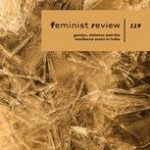 Feminist Review is calling for articles and Open Space pieces for a themed issue on ‚Archives‘ (Web)
Feminist Review is calling for articles and Open Space pieces for a themed issue on ‚Archives‘ (Web)
Proposals due: 08.04.2019
This themed issue will focus on the ways in which we encounter the archive and how we might engage archives within feminist, queer and decolonial studies. There has been substantial work in recent years, from different contexts and traditions, on the use of archives. Archives are bound up with the question of whose history is worth preserving.
Scholars in postcolonial and decolonial studies have broadened our understanding of archives by thinking of ‚imperial archives‘ (Richards, 1993; Stoler, 2002) and colonialism as a ‚cultural archive‘ (Said, 1977; Wekker, 2016), providing ways of understanding how the documents left behind by empire were made, distributed and stored, as well as questioning what is meant by a document; to document is an action that is performed in relation to bodies. For feminist scholars, activists and artists, the archive has become an imperative site for preserving, remembering and celebrating feminist work and histories for younger generations (Eichhorn, 2013). In queer studies, archives have been identified as ‚archives of feeling‘ (Cvetkovich, 2003) as well as ‚ephemeral‘ (Halberstam 2005; Kumbier 2014) or ‚make-shift or randomly organized‘ (Muñoz, 1996).
What kinds of approaches can be developed to address these multiple modalities of the ‚archive‘, and what kinds of affective registers, geographies and temporalities are invoked by archival research? As a starting point, we recognise that even archives without official homes, which operate to counter institutional histories, have their own exclusions and omissions. The archive is never a neutral site. Memories, stories and material from Black feminists and feminists of colour as well as Black queers and queers of colour are often left behind. As Ego Ahaiwe Sowinski and Yula Burin (2014, p. 116) suggest, ‚It is essential for us to see how the struggles we still face have been challenged in the past. We need to look back from a black feminist perspective‘. And how do archives challenge or reproduce the violences that they document? Why do archives matter?
In asking these questions, this themed issue takes into account and invites discussions on the limitations of knowing beyond the archive (Ndlovu, 2011), the politics of exclusion in archival practice (Peterson, 2002), and the need to read against the grain of colonial and racialised archival histories (Hartman, 1997; Stoler, 2002). We aim to explore how the institutional archive can be made feminist, queered, decolonised and cripped, and in which ways we can build on transnational archives as well as establish our own archives. We welcome academic, activist and artistic engagements that think with the material, logistical and theoretical dimensions of the archive from a range of disciplines and perspectives.
Contributions may include, but are not limited to:
- Black feminist and feminist-of-colour genealogies: What does the archive tell us about these feminist genealogies? How do shifting political conditions inform present day archival practices?
- Transnational Feminist Archives: What do historic transnational exchanges between feminists tell us about alliance-building? In which other ways can we build transnational feminist archives such as through arts, performance, sound or storytelling?
- Gatekeeping the Archive: Who or what is archiving and for whom? How do we deal with ownership, gatekeeping and memory making?
- Archivists in the Archive: In which ways do archivists engage feminist, queer and diasporic collections, and how are the archives of historically marginalised people prioritised?
- Queer Archives: How do ‚queer archives‘ or a practice of ‚queering the archive‘ destabilise the fabrication and telling of linear narratives?
- Activist Archives: How can we start archiving current and ongoing struggles that are led by Black, people of colour, indigenous people, trans and queer people? Is the archive still relevant in the digital world? How do present-day activists think about the need for documentation and access?
- Queering and Decolonising the Archive: What is the relationship between queering and decolonising the archive?
- Colonial Archives: How do we deal with contested colonial legacies and archives? How can violence be reproduced through the archive? How do the colonial representations of race, gender and class influence present day archives?
- Cripping Archives: How is dis/ability archived? What are the interanimations between able-bodied heteronormativity and the construction of archives? What is the relationship between bodies, feelings and archives?
- Pleasure Archives: How are sexuality, intimacy and self-love represented in the archive?
- Future Archives: How do futurity and speculation relate to the archive? How do alternate temporalities and geographies impact the futurity of the archive? What are speculative ways of engaging the archive?
- Queer, Feminist and Decolonial methods and methodologies: What kind of innovative and interdisciplinary methodologies can we develop and practice with archives, archival materials and affects?
Issue Editors: Nydia A. Swaby, Chandra Frank and Yasmin Gunaratnam.
If you would like to discuss your ideas for this issue, please contact the editors at ns31@soas.ac.uk, cfran001@gold.ac.uk, and y.gunaratnam@gold.ac.uk.
Full articles and Open Space pieces must be submitted by 8 April 2019.
Manuscripts should be submitted through Feminist Review’s online submission system and in FR house style. Please visit www.feminist-review.com and https://mc.manuscriptcentral.com/feministreview to read full instructions for authors.
